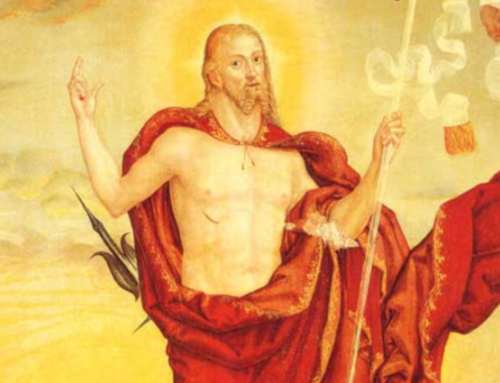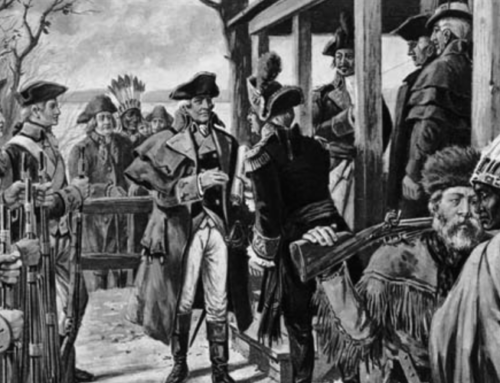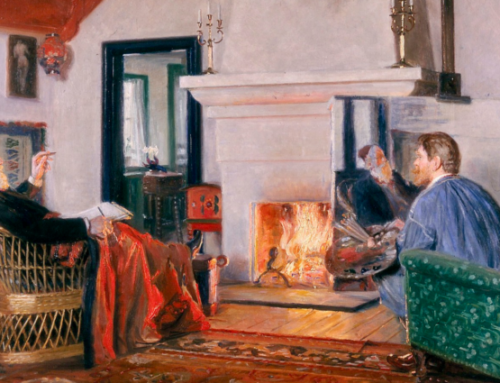 Patrick Deneen, over at Front Porch Republic, has posted reflections on what he deems the lack of a conservative tradition in America (find it here). My first instinct, on being shown the piece by Winston Elliott, was that its errors were too numerous and thoroughgoing to address, and that to do so might seem churlish, especially because I am happy to call several contributors to the blog my friends. However, on further reflection, Professor Deneen is calling into question the scholarship of some colleagues I admire (as well as my own scholarship, of course) in a manner that makes them look rather foolish, as well as completely ignoring a central theme of Russell Kirk (and pretty much all traditional conservatives) in their work on the American tradition; and so I feel compelled to at least point out a few problems.
Patrick Deneen, over at Front Porch Republic, has posted reflections on what he deems the lack of a conservative tradition in America (find it here). My first instinct, on being shown the piece by Winston Elliott, was that its errors were too numerous and thoroughgoing to address, and that to do so might seem churlish, especially because I am happy to call several contributors to the blog my friends. However, on further reflection, Professor Deneen is calling into question the scholarship of some colleagues I admire (as well as my own scholarship, of course) in a manner that makes them look rather foolish, as well as completely ignoring a central theme of Russell Kirk (and pretty much all traditional conservatives) in their work on the American tradition; and so I feel compelled to at least point out a few problems.
Deneen’s thesis, that America is by nature liberal on account of its perpetual commitment to free markets and limited government is, by his own account, not new. And his a-historical emphasis on a few sentences from the Declaration of Independence and the desires of some federalists for centralization has been the hobby horse of Harry Jaffa and his acolytes for decades. What is unusual in this essay is Deneen’s portraying himself as a critic of this “liberal founding” and his identification of a rather common thesis about the derailment of our constitutional tradition with the followers of Leo Strauss. It is wrong, he says, to claim that America was conservative in its institutions, beliefs, and practices until the coming of the centralizing Progressive movement of the early twentieth century. Indeed, he argues, to make this claim is to fall afoul of the Straussian model of “two waves” of modernity. On this reading the individualism of natural rights theory (Hobbes and Locke) naturally led to the “historicism” of the second wave (Rousseau, literary critics, and, not surprisingly given Strauss’ disdain for tradition, Burke).
I am sure Professor Deneen sees himself as presenting a good “conservative,” rejection of modernity. Alas, the stance rests on historical ignorance. Indeed, I am impressed by just how deeply Straussian Deneen’s take on American character really is, particularly in its emphasis on a radically de-contextualized understanding of the founding era.
It would take a book to point out all the problems with this line of argument. But I will provide a few brief examples: Strauss was simply wrong about modernity’s claim to having “discovered” natural rights (as Brian Tierney, among others, has shown, rights were a topic of concern during the so-called Middle Ages – as, indeed, was the hypothetical state of nature); the justly pilloried Locke was neither a follower of Hobbes nor an original thinker, but someone rehashing and thinning-out well over a hundred years of Calvinist thought and practice with its roots in Church covenants (something shown by Donald Lutz, no conservative, among others); the Declaration of Independence itself was a largely conservative document, taken up with a list of charges against the king rooted in a charter tradition going back through the English Bill of Rights, the Petition of Right and, ultimately, to Magna Charta (frankly anyone who reads the document should be able to figure this one out). The list goes on.
But let us at least begin with Burke, dismissed by Strauss as a “historicist” and ignored by Deneen. It was Burke who saw the American Revolution as all but inevitable given BRITAIN’s radical claims to absolute sovereignty over her colonies. Burke saw America, not as the creature of ideology (liberal or otherwise) but as the product of a long history both in Britain and in America. The deep roots of this history can, of course, be examined in Kirk’s Roots of American Order—a rather substantial book on the conservative origins of American constitutionalism. Roots is a lively and entertaining as well as enlightening read; I recommend it highly to Professor Deneen, as well as everyone else. What is more, as Deneen should know, the American Revolution has been looked to for centuries as the antithesis of the radical French Revolution in its attachment to prescriptive rights and ordered liberty—Friedrich Gentz already had this right by 1800. That attachment to custom, common law, and decentralized power was part of the mindset among the vast majority of Americans of the era has been shown repeatedly, and is all but self-evident—requiring only open-eyed reading of the relevant texts from the likes of Dickinson, Adams, Wilson, and even Jefferson.
In sum, Deneen’s critique of conservative explanations of contemporary ills–his argument that the Progressives were carrying on the tradition begun at our “liberal” founding—is radically wrong. It is based on a misreading of that founding that can only harm our self-understanding. Moreover, this mistaken argument lumps together with Straussians a number of wise and knowledgeable scholars–including our own George Carey, whose small classic, The Basic Symbols of the American Political Tradition (written with Willmoore Kendall) is the best counter argument I know.
Perhaps most important, Deneen’s conflation of our national traditions with a liberal reading of some few passages from a few documents taken out of historical context, plays into the hands of the pseudo-intellectual profiteers currently in charge of “our” institutions—be they the current administration, the Republican party (like all parties at all times essentially opportunistic), various “non-profit” think tanks, leaders of which line their own pockets by selling themselves and their employees to said party, and some few “philanthropists” who confuse their ability to amass large sums of money (whether ethically or not is at best an open question) with the right to collect minions and lecture the rest of us on the meaning of our tradition.
Conservatism does, in fact, entail support for economic liberty (like all liberties, properly well-ordered). And it does entail an emphasis on limited government (in particular decentralized government) so as to foster the more fundamental institutions of family, church, and local association. It does not entail worship of mammon, dreams of world empire, warmed over Kantian game-playing tarted up in Catholic dress, or a rejection of the long tradition that produced our own founding.
Those interested in the clear difference between traditional conservative and “liberal” readings of the American founding might want to look at a debate on the nature and purpose of the American Constitution here. It includes my own brief synopsis of the historical context of our Constitution, along with a rather longer response from the libertarian Randy Barnett.
Books on the topic of this essay may be found in The Imaginative Conservative Bookstore. The Imaginative Conservative applies the principle of appreciation to the discussion of culture and politics—we approach dialogue with magnanimity rather than with mere civility. Will you help us remain a refreshing oasis in the increasingly contentious arena of modern discourse? Please consider donating now.







Writing Burke out of the list of writers influential to the Founders sounds a bit like airbrushing Politburo members off the balcony photo with Stalin.
I never read Strauss after Dr Kirk dismissed him one day with a cursory wave of the cigar. "A m-m-mountebank," he explained. "Just a mountebank. He aspires to lead a cult like the Beatles' guru."
By the way, has anyone more Kirk observations on The Beatles?
s masty
OK, I don't mean to come down hard one way or the other here, but I'm not sure you've done right by Prof. Deneen. While he obviously accepts Strauss' argument about the two waves of liberalism, I know for a fact that he isn't a thorough-going Straussian. For instance, he made an extensive argument a few months back at Front Porch Republic on why "Great Books"-style education (on the St. John's model) is problematic. Why? Because it entails presenting texts outside the tradition(s) that have made them possible. Deneen supports the right kind of historicizing, then.
And Burke–who knows what he thinks about Burke? I believe you were riffing on Strauss, there, not Deneen.
Another question: you say that Locke is an intellectual descendant of a strain of Calvinist thought, rather than Hobbes. Why does it have to be one or the other? To say that Locke bears no organic relation to Hobbes seems patently ridiculous, but perhaps that is not what you meant. You got into that, I believe, as you tried to argue against Strauss' understanding of Natural Right. And yet he (Strauss) did not imagine that it was, strictly speaking, a modern invention either. Rather, he argued that the form it takes in the modern philosophers represents a significant departure from the Natural Law/Right tradition which stretches back through Rome and Greece. Would you really disagree with this?
Well, Dwight, it certainly is nice to hear that Professor Deneen "isn't a thorough-going Straussian." I don't recall saying he was, but this is nice to know. It also is nice to know that Deneen has criticized the context-less nature of most so-called Great Books programs. The criticism loses a bit of its potential punch, however, coming from someone who bases his characterization of the American political tradition on a few sentences from a rhetorical document and a cursory glance at a few criticisms of the frame of government. As to the Locke/hobbes "organic relation," the term you use is, shall we say, underdetermined. Is hostility and organic relation? Perhaps, and Locke saw himself as among those many, many writers hostile to the Hobbesian vision. Of course, this is one area where the Straussian claim to understand philosophers as they understood themselves rests upon "esoteric" reading. In regard to this and to your other point, about Strauss supposedly recognizing modernity as a departure from a pre-existing tradition, I would recommend any of dozens of books and articles by the likes of Brian Tierney, Dick Helmholz, and Hal Berman pointing out the amazing myopia of the Straussian vision, which leaves the Middle Ages as one huge, long blank. Modernity was not some phillsopher-led "break" with ancient philosophy, but a development of a number of (particularly Christian) themes and concerns, particularly in opposition to the totalist claims of early modern sovereignty–including in the thought of Bodin, Machiavelli and Hobbes, but more fundamentally in political practice and the development of a unitary legal/political order. That it went off the rails seems self-evident. That the epistemological radicalism of Locke and others operating within the Calvinist tradition seems clear as well, though invisible to anti-historical students of ideology. None of which should be taken as implying that Professor Deneen is not a very nice fellow.